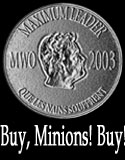Greetings, loyal minions. Your Maximum Leader would like to devote more mental energy than his time really allows to give his thoughts on a recent post of Brian’s over at Memento Moron. The post is entitled 23 Days Late.
Brian, in the post, does some important introspection about his political views and his views of the Constitution. He makes an interesting point about “means” and “ends” in the application of Constitutional law.
The post caused your Maximum Leader to think a little bit. A few weeks ago the Minister of Propaganda and your Maximum Leader were talking about the uncanny similarity of results in many of those silly quizzes we from time to time take here at Naked Villainy. We had a little moment of epiphany. Our outlook on so many issues is very similar, but the foundations of our beliefs are very different. For the Minister of Propaganda the well-being and good of the community is central for your Maximum Leader the well-being and good of individual is central. (This little bit is greatly paraphrased.)
But Brian brings up a point that your Maximum Leader thinks we all must reflect on a little bit more. Examine the difference in language between the Constitution and the Declaration that Brian notes. The Constitution is talking about our Union, common defence, general welfare, “ourselves.” The Declaration speaks about individual men being created equal, government deriving powers from the consent of individuals. There is a little bit of a dichotomy here that is part of the “problem” with the American ideal. We want to have as much personal liberty as possible in a strong community. At some point those two concepts are in conflict.
Look, for example, at the reaction to the Kelo decision of the Supreme Court. The Court upheld that the Community can take property from an individual for not only “common” use (which was a long-settled question of law) but for the general improvement of the community by another private party.
This decision repulses your Maximum Leader. While he has no objection to the taking of private property (with compensation) for public use; he does object strongly to taking private property (with compensation) and delivering it unto another individual (or private group) for private use. He understands all the nuance to the argument, he just disagrees with the principle.
But this points out the conflict of which he was speaking. Common good? Or individual protection?
Indeed, the War on Terror gives us many more examples of this conflict. Profiling airline passengers. Surveillance in public places. Watch lists. All these are critical questions that as a society we should only attempt to answer after we have an understanding of our own core beliefs and what we consider most important.
Perhaps Brians ruminations and commentary upon them will lead others to think more about what they believe and why.
Carry on.


